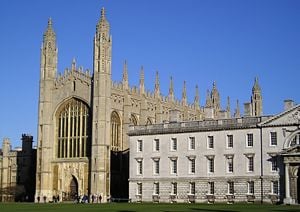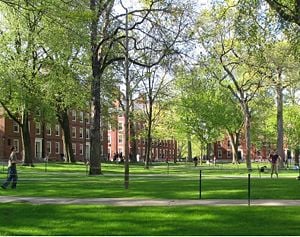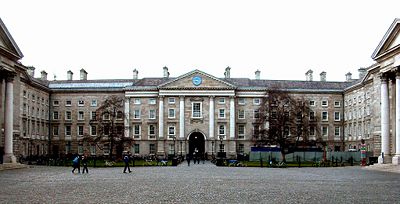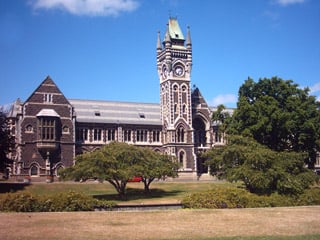College
 From Nwe
From Nwe | Schools |
|---|
| Education |
| History of education |
| Pedagogy |
| Teaching |
| Homeschooling |
| Preschool education |
| Child care center |
| Kindergarten |
| Primary education |
| Elementary school |
| Secondary education |
| Middle school |
| Comprehensive school |
| Grammar school |
| Gymnasium |
| High school |
| Preparatory school |
| Public school |
| Tertiary education |
| College |
| Community college |
| Liberal arts college |
| University |
College is a term that has several different uses; most often it is used in the context of post-secondary education, either to describe an entire certificate or degree granting institution, or a sub-division within a larger organization. In the past, colleges were subsumed within a university system, operating more as the home for students and providing training. The university was the body which granted the degree after students completed their time of study and satisfied requirements, usually involving examinations, set by the university. This is the major difference between a college and a university: Universities are usually larger institutions that incorporate different schools or colleges, although within the English-speaking world, college is often used to describe all post-secondary educational programs and institutions.
Regardless of their exact nature, colleges fall within the purview of education, in particular higher education after the level considered necessary to function effectively as an adult citizen—that offered by elementary and high schools. As such, colleges teach more specialized mastery of particular skills, greater depth in academic knowledge, or otherwise advance the individual interests and talents of their students. This aspect of education is built on, and requires, the foundation of earlier education, which includes not only academic knowledge but the emotional development and social skills that are acquired in earlier childhood.
Etymology
The word college comes from the Latin collegium, which originally meant a group of people living together under a common set of rules (con-, "together" + leg-, "law"); the tradition continues up to this day as some colleges call their members "fellows."[1] However, the Romans did not use the word college to denote an educational institution. It was, in fact, adopted for such use by the French in the early fourteenth century, in the form of collège. From there, it was passed on to Middle English.[2]
Definitions
The post-secondary educational system, (or Higher education as it is sometimes referred to) is responsible for providing education beyond compulsory schooling, (usually Secondary schooling). Unlike Primary and secondary, higher education is not mandatory; students are admitted to most post secondary institutions through an admissions process that can be competitive. Prospective students are able to choose which institutions to apply to and have the option not to attend a higher education school if they chose not to. There are many different types of schools in the post-secondary educational system, and a college is one form.
While the terms "university" and "college" are often used interchangeably, they are in fact, two different types of institutions. Colleges are often undergraduate institutions that grant Associate or Bachelor level degrees in the field of Liberal Arts and Sciences or vocational certificates. Some colleges offer post-graduate level programs and research institutions, but more often it is the larger universities that are better known for such programs. Colleges also tend to be smaller organizations than their university counterparts.
Sometimes college is used to describe particular schools of study within a university (such as, College of Engineering, College of Nursing; in America, often the term "school" is employed instead of college, such as the School of Physical Sciences). These colleges are institutions devoted to a particular field of study and are responsible for all administrative duties within their programs of study. Sometimes a student must apply both to the university at large as well as to the college of study they wish to study in. Colleges can also be used to describe a cluster of buildings or facilities at a large university.[3]
History
Colleges did not originate as they stand today. Originally, colleges, as the Latin name applies, were groups or associations connected to larger universities. Oftentimes in Europe, colleges were where students lived, housed libraries, and offered tutoring. In France, these colleges started as charity donations for students who wanted to attend a university but could not afford housing at the regular costs.[4] Early colleges would also help students prepare for exams and were charged with maintaining collections that would eventually become museums and scientific research institutions.[5]
Eventually, colleges as separate entities began to emerge in the mid to late nineteenth and early twentieth centuries when more and more higher educational institutions started to emerge in the Western world. Economics and logistics made it more practical for smaller institutions to be built, rather than attempt to create universities, especially since it had taken the great universities of the world hundreds of years to become as large and complex as they were. Hence, smaller institutions were created, focusing on the undergraduate level of education, minus the cost of large storage and research facilities, and adaptable to the needs of the community it was built in. Thus, the college as an independent entity was created, while college as a specific school in a large university remained.
Organization
Although each institution is organized differently, nearly all colleges have a board of trustees, a president, chancellor or rector, at least one vice president, vice-chancellor or vice-rector, and deans of various divisions. Colleges are generally divided into a number of academic departments. Public college systems are ruled over by government-run higher education boards. They review financial requests and budget proposals and then allocate funds for each college in the system. They also approve new programs of instruction and cancel or make changes in existing programs. In addition, they plan for the further coordinated growth and development of the various institutions of higher education in the state or country. However, many public colleges in the world have a considerable degree of financial, research, and pedagogical autonomy. Private colleges are privately funded having generally a broader independence from state policies.
Cultural variants
United Kingdom
British usage of the word "college" remains the loosest, encompassing a range of institutions:
- Colleges of further education and adult education.
- "Sixth form colleges," where students do A Levels, and some specialist schools
- The constituent parts of collegiate universities, especially referring to the independent colleges of Oxford, Cambridge and Durham.
- A name given to large groupings of faculties or departments, notably in the university of Edinburgh, and possibly the university of Birmingham under restructuring plans.
- University colleges—independent higher education institutions that have been granted degree-awarding powers but not university status.
- Certain public schools for children such as Eton and Winchester.[6]
- Professional associations such as the Royal College of Organists, the Royal College of Surgeons and other various Royal Colleges.
- The College of Justice or Court of Session of Scotland
In general use, a "college" refers to: Institutions between secondary school and university, colleges of further education and adult education. These types of institutions were usually referred to as technical colleges, or tech for short. Recently in the United Kingdom, however, with the differences in functionality between universities and colleges becoming less clear-cut, and with the phasing out of polytechnical colleges, many people are starting to refer to them simply as "college." Many types of institutions have "college" in its name but are not "colleges" in the general use of the word. For example, Eton College would not be referred to as a college, but as a school or by its full name.
United States of America
In American English, the word, in contrast to its many and varied British meanings, almost always refers to undergraduate university studies or to a school providing professional or technical training on a (loosely) comparable level. It can therefore refer to both a self-contained institution that has no graduate studies and to the undergraduate school of a full university (that also has a graduate school). The usual practice in the United States today is to use "university" in the official names of institutions made up of several faculties or "schools" and granting a range of higher degrees while "college" is used in the official names of smaller institutions only granting bachelor's or associate's degrees. Nevertheless, several prominent American universities, including Boston College, Dartmouth College, College of Charleston, and College of William and Mary, have retained the term "college" in their names for historical reasons though they offer a wide range of higher degrees.
The term college is also, as in the United Kingdom, used for a constituent semi-autonomous part of a larger university but generally organized on academic rather than residential lines. For example, at many institutions, the undergraduate portion of the university can be briefly referred to as the college (such as The College at Brown, Harvard College at Harvard, or Columbia College at Columbia) while at others each of the faculties may be called a "college" (the "college of engineering," the "college of nursing," and so forth). There exist other variants for historical reasons; for example, Duke University, which was called Trinity College until the 1920s, still calls its main undergraduate subdivision Trinity College of Arts and Sciences.
Some American universities, such as Princeton, Rice, and Yale do have residential colleges along the lines of Oxford or Cambridge. Unlike the Oxbridge colleges, these residential colleges are not autonomous legal entities, nor are they typically much involved in education itself, being primarily concerned with room, board, and social life. At the University of California, San Diego, however, each of the six residential colleges does teach its own core writing courses and has its own distinctive set of graduation requirements. Some institutions, such as the University of Chicago use the term "college" to distinguish their undergraduate program from their graduate and research programs.
It should be noted, too, that "university" and "college" do not exhaust all possible titles for an American institution of higher education. Other options include "institute" (Massachusetts Institute of Technology), "academy" (United States Military Academy), "union" (Cooper Union), "conservatory," and "school" (Julliard School).
Australia
In Australia, the term "college" can refer to an institution of tertiary education that is smaller than a university, run independently or as part of a university. Following a reform in the 1980s many of the formerly independent colleges now belong to a larger university. Many private high schools that provide secondary education are called "colleges" in Australia. The term can also be used to refer to residence halls, or dormitories, as in the United Kingdom, but compared to the UK their tutorial programs are relatively small-scale and they do no actual teaching towards academic degrees, with the exception of one or two that host theological colleges. In the state of Victoria, most public schools providing secondary education are known as secondary colleges.
Additionally, in Tasmania and the Australian Capital Territory, "college" refers to the final two years of high school (years eleven and twelve), and the institutions which provide this. In this context, "college" is a system independent of the other years of high school. (Here, the expression is a shorter version of matriculation college.) All college courses in the ACT are sanctioned by the Board of Senior Secondary Studies, or BSSS.
Canada
In Canada, the term "college" usually refers to a community college or a technical, applied arts, or applied science school. These are post-secondary diploma-granting institutions, but they are not universities and typically do not grant degrees, except in British Columbia, where some have university status.[7] In Quebec, it can refer in particular to CEGEP (Collège d'enseignement général et professional, "college of general and professional education"), a form of post-secondary education specific to the Quebec education system that is required in order to continue onto university, or to learn a trade. In Ontario, there are also institutions which are designated university college as they only grant under-graduate degrees. This is to differentiate between universities which have both under-graduate and graduate programs and those that do not. There are very few university colleges in Ontario, as most universities have graduate programs.
The Royal Military College of Canada, a full-fledged degree-granting university, does not follow the naming convention used by the rest of the country.
The term "college" also applies to distinct entities within a university (usually referred to as "federated colleges" or "affiliated colleges"), akin to the residential colleges in the United Kingdom. These colleges act independently, but in affiliation or federation with the university that actually grants the degrees. For example, Trinity College was once an independent institution, but later became federated with the University of Toronto, and is now one of its residential colleges. Occasionally, "college" refers to a subject specific faculty within a university that, while distinct, are neither federated nor affiliated—College of Education, College of Medicine, College of Dentistry, among others.
There are also universities referred to as art colleges, empowered to grant academic degrees of BFA, Bdes, MFA, Mdes, and sometimes collaborative PhD degrees. Some of them have "university" in their name (Nova Scotia College of Art and Design University) and others do not (Ontario College of Art & Design and Emily Carr Institute of Art and Design).
Ireland
In the Republic of Ireland, the term "college" is usually limited to an institution of tertiary education, but the term is quite generic within this field. University students often say they attend "college" rather than "university," with the term college being more popular in wider society. This is possibly due to the fact that, until 1989, no university provided teaching or research directly. Instead, these were offered by a constituent college of the university, in the case of the National University of Ireland and University of Dublin—or at least in strict legal terms. There are many secondary education institutions that use the word "college." Many secondary schools formerly known as technical colleges, were renamed as community colleges. These are secondary institutions in contrast to the American community college.
Hong Kong
In Hong Kong, the term "college" has a range of meanings, as in the British case. In the first case it can refer to a secondary school. It is also used by tertiary institutions as either part of their names, such as Shue Yan College; to refer to a constituent part of the university, such as the colleges in the collegiate Chinese University of Hong Kong; or to a residence hall of a university, such as St. John's College, University of Hong Kong.
India
The term "university" is more common than "college" in India. Generally, colleges are located in different parts of a state and all of them are affiliated to a regional university. The colleges offer programs under that university. Examinations are conducted by the university at the same time for all colleges under its affiliation. There are several hundred universities and each university has affiliated colleges.
The first liberal arts and sciences college in India was the Presidency College, Kolkata (established 1817) (initially known as Hindu College). The first Missionary institution to impart Western style education in India was the Scottish Church College, Calcutta (established 1830). The first modern university in India was the University of Calcutta (established January 1857). The first research institution for the study of the social sciences and ushering the spirit of Oriental research was the Asiatic Society, (established 1784). The first college for the study of Christian theology and ecumenical inquiry has been the Serampore College (established 1818).
Singapore
The term "college" in Singapore is generally only used for pre-university educational institutions called "Junior Colleges," which provide the final two years of secondary education (equivalent to sixth form in British terms or grades 11-12 in the American system). Since January 1, 2005, the term also refers to the three campuses of the Institute of Technical Education with the introduction of the "collegiate system," in which the three institutions are called ITE College East, ITE College Central, and ITE College West respectively.
The term "university" is used to describe higher-education institutions offering locally-conferred degrees. Institutions offering diplomas are called "polytechnics," while other institutions are often referred to as "institutes" and so forth.
New Zealand
In New Zealand, the word "college" normally refers to a secondary school for ages 13 to 17. In contrast, most older schools of the same type are "high schools." Also, single-sex schools are more likely to be "Someplace Boys/Girls High School," but there are also very many coeducational "high schools." The difference between "high schools" and "colleges" is only one of terminology. There does seem to be a geographical difference in terminology: "Colleges" most frequently appear in the North Island, whereas "high schools" are more common in the South Island.[8]
The constituent colleges of the former University of New Zealand (such as Canterbury University College) have become independent universities. Some halls of residence associated with New Zealand universities retain the name of "college," particularly at the University of Otago (which although brought under the umbrella of the University of New Zealand, already possessed university status and degree awarding powers).
Some universities, such as the University of Canterbury, have divided their University into constituent administrative "Colleges"—the College of Arts containing departments that teach Arts, Humanities and Social Sciences, College of Science containing Science departments, and so on.
South Africa
Similar to New Zealand, in South Africa the word "college" normally refers to a secondary school. Nevertheless, most secondary schools are called "Someplace High (School)." The word "college" in South Africa generally implies that the school is private. In many cases, the high school is exclusive and follows the English public school model. Thus, no less than six of South Africa's Elite Seven high schools call themselves "college" and fit this description. A typical example of this category would be St. John's College.[9]
Another category of private high schools also use the "college" term. However, these schools do not follow the British public school model, but rather are more informal in character and specialize in improving children's scores through intensive focus on examination needs. These "colleges" are thus often nick-named "cram-colleges."
Although the term "college" is hardly used in any context at any university in South Africa, some non-university tertiary institutions call themselves colleges. These include teacher training colleges, business colleges, and wildlife management colleges to name a few.
Notes
- ↑ Oxford English Dictionary (Oxford Press, 1971, ISBN 019861117X).
- ↑ American Heritage Dictionary of the English Language, College Retrieved November 17, 2007.
- ↑ Dictionary.com, College. Retrieved November 17, 2007.
- ↑ The New Oxford Companion to Literature in French, Collège. Retrieved December 5 2007.
- ↑ Britannica Concise Encyclopedia, University. Retrieved December 22, 2007.
- ↑ Eton College, Eton’s History. Retrieved November 17, 2007.
- ↑ Glen A. Jones, Higher Education in Canada: Different Systems, Different Perspectives (Routledge, 1997, ISBN 0815322992).
- ↑ Sholeh A. Maani, Investing in Minds: The Economics of Higher Education in New Zealand (Institute of Policy Studies, 1997, ISBN 0908935110).
- ↑ Ian Bunting, A Legacy of Inequality—Higher Education in South Africa (University of Cape Town Press, 1997, ISBN 0799215155).
References
ISBN links support NWE through referral fees
- Bunting, Ian. 1997. A Legacy of Inequality—Higher Education in South Africa. University of Cape Town Press. ISBN 0799215155.
- Jones, Glen A. 1997. Higher Education in Canada: Different Systems, Different Perspectives. Routledge. ISBN 0815322992.
- Maani, Sholeh A. 1997. Investing in Minds: The Economics of Higher Education in New Zealand. Institute of Policy Studies. ISBN 0908935110.
Credits
New World Encyclopedia writers and editors rewrote and completed the Wikipedia article in accordance with New World Encyclopedia standards. This article abides by terms of the Creative Commons CC-by-sa 3.0 License (CC-by-sa), which may be used and disseminated with proper attribution. Credit is due under the terms of this license that can reference both the New World Encyclopedia contributors and the selfless volunteer contributors of the Wikimedia Foundation. To cite this article click here for a list of acceptable citing formats.The history of earlier contributions by wikipedians is accessible to researchers here:
The history of this article since it was imported to New World Encyclopedia:
Note: Some restrictions may apply to use of individual images which are separately licensed.
↧ Download as ZWI file | Last modified: 02/03/2023 19:33:59 | 258 views
☰ Source: https://www.newworldencyclopedia.org/entry/College | License: CC BY-SA 3.0
 ZWI signed:
ZWI signed:








 KSF
KSF